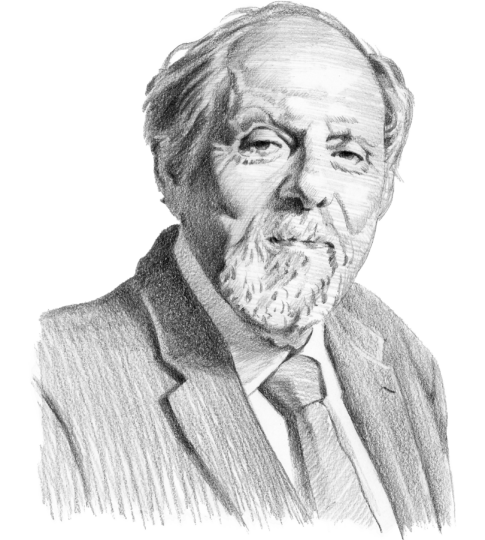The United States as a sulking superpower
Why Americans feel that the U.S. global order and its leadership have been sullied and what that means for the future of the free world.

In a nutshell
- The U.S. is losing its self-assurance as a global power
- Its efforts for global peace and prosperity are unappreciated
- The temptation to return to historical isolationism is gaining strength
The idea that the United States is facing significant internal fragmentation – politically and socially – has gained widespread credence. This fragmentation seems to be intensifying, as prominent political and ideological factions become entrenched in their views. Consequently, their positions are growing more fundamentalist, the disagreements are becoming louder and reaching a consensus on any issue is becoming increasingly challenging.
Without dwelling on the origins of this process nor on why it has become another American cultural commodity export, what matters more is that despite the divisions, there are still issues on which the two warring camps seem to agree.
One of the most important is the view that the U.S. should adopt a more economically and financially self-centered strategy, especially when it comes to investments and production. That marks a significant departure from the consensus of the golden era of globalization in the 1990s and 2000s when, following the U.S. victory in the Cold War, America championed and sustained globalization by establishing and enforcing its rules.
The turn inward
The first signs of a shift away from globalization emerged shortly after the Great Recession of 2008-2009, and accelerated with the election of Donald Trump, who campaigned in 2016 on an “America First” platform. The most recent and strongest push toward economic nationalism followed the Covid-19 pandemic and the August 2022 passage of the Inflation Reduction Act under President Joe Biden.
This shift is likely to continue regardless of the outcome of the 2024 U.S. presidential election. The “America First” mantra will remain, overtly and covertly, a central theme for years to come. There are several reasons for this.
The explanation provided may come across as provocative not only to those who view America as a malevolent force but also to those who maintain that the U.S. wields excessive geopolitical power that it often misuses. Individuals with their own visions of a more ideal world order in which America’s role is diminished will also object. Yet here it is.
The Big Sulk
The U.S. today harbors a deep-seated sense of betrayal, seeing itself as a superpower jilted by an ungrateful global community. This sentiment has manifested itself in the heated debates and arguments that have gripped the nation in recent elections as the U.S. grapples with its evolving role on the world stage.
The North American power began to assert its dominance on the global stage in the 20th century, playing a crucial role in saving Europe from the brink of self-destruction during two world wars, those bloody conflagrations that also ensnared much of the rest of the world. Despite the traumatic experience in Vietnam, the U.S. largely stood on the side of order against chaos in Asia as well. The post-World War II successes of West Germany, Japan and South Korea testify to America’s commitment to fostering a stable and functioning free world.
With its Cold War triumph over the Soviet Union, the U.S. emerged as the world’s sole superpower, its global dominance nearly absolute. In an era of crumbling borders, growing openness and the international division of labor, America sought to showcase and enforce its economic and political model, exporting it to all corners of the globe. The aim was to create a world system that would be profitable, livable and secure for the U.S. and its allies.
In a nutshell, if all countries were just a little bit more like the U.S., the world would be a better place for all. For a superpower motto, that was romantic (we will get to America’s use of force). A more historically typical approach for a dominant power is issuing an ultimatum: Do as we say, or you will suffer.
However, three decades later, America is not happy. While globalization has brought about the opening of the world, the falling of barriers to the movement of capital and goods and a rapid increase in prosperity in many parts of the globe, it has not necessarily resulted in a more peaceful and secure world for the U.S.; its enemies are hardly lesser or fewer.
If outside observers of the American political scene tuned in to this set of feelings, perhaps they would better grasp the tone and flavor of recent U.S. presidential campaigns.
Indeed, this is not a “Westernized” world operating in accordance with the market-driven philosophy of the Washington Consensus (a set of recommended economic and financial policies promoted after 1989 by the International Monetary Fund, the World Bank and the U.S. Department of Treasury). It must be a frustrating outcome for the proponents of American global engagement: In the end, the project of sharing the U.S. economic and democratic know-how has produced only a richer and more assertive China, a more dangerous and cunning Russia, and has done little to tame lesser adversaries, from Iran to North Korea.
China, which aspires to be the new CEO of the planet, comes with its distinct set of undemocratic and illiberal rules. One can almost hear America’s lament: And for all this, plus the malus of new enemies we did not ask for, we have paid with the economic headwinds that have transformed the Rust Belt – once the symbol of American industrial might – into a shadow of its former self.
If outside observers of the American political scene tuned in to this set of feelings, perhaps they would better grasp the tone and flavor of recent U.S. presidential campaigns.
The idealistic and embittered superpower can emotionally resonate with Donald Trump’s sweeping statements, which posit that the rest of the world no longer takes the U.S. seriously. This offended America feels unappreciated for its generosity and good intentions. Consider these words of vice-presidential candidate James David “JD” Vance on the old continent and NATO:
The United States has provided a blanket of security to Europe for far too long. In the aftermath of the Cold War, European nations made deep and lasting cuts to their defense budgets. Estimates suggest the continent would have spent an additional $8.6 trillion on defense over 30 years had they maintained Cold War levels of military expenditure. As the American defense budget nears $1 trillion per year, we ought to view the money Europe hasn’t spent on defense for what it really is: an implied tax on the American people to allow for the security of Europe.
Anti-American protests in Europe

The way quite a few Americans see it, Europe has long defaulted on its defense obligations while maintaining an endless supply of hypocrisy in offering unsolicited advice on how the U.S. should conduct its global affairs. However, when these “free riders” in Europe learn that the U.S. security guarantee can no longer be relied upon unconditionally, they recoil in horror for their safety.
It is a paradox when various adversaries frequently accuse the defender of the world order of being the source of all evil. Internally, America must wonder: Really? This – about us? So, it is true that no good deed goes unpunished.
Such feelings certainly do not lead to pleasant prospects, whether in personal relationships or among great powers.
Soft power, hard power and the global cop
The paradox is intriguing because the U.S. is seen globally as mainly employing hard power – military force – with mixed outcomes. Conversely, China is often described as a major power that effectively utilizes soft power, focusing on non-lethal means to exert influence. This perception becomes laughable when one considers the vast soft power of American culture, media, marketing, corporate practices, universities, social networks and markets. Aside from TikTok, China lacks comparable entities to challenge the U.S. in these domains.
Read more on the U.S. and Europe
- Geopolitical facts arrive in Europe
- The future of U.S.-Europe trade
- Is the U.S. going back to the Western Balkans?
- The contest over the Black Sea in the new Cold War
While Hollywood films are widely shown and streamed across the globe, Chinese movies are typically confined to niche channels catering to specific audiences. American popular music is known worldwide; in contrast, who listens to Chinese pop outside of China’s cultural sphere? Likewise, Russia and Iran make no effort to present anything comparable.
American stocks are routinely traded on the world’s most liquid market, attracting investors from around the globe, whereas Chinese shares struggle to compete. China is not a source of anything important that others would want to emulate (its well-established cuisine aside). The true measure of soft power lies in people’s willingness to consume, imitate and adopt the creations of another culture or country.
The relentless verbal assaults by rogue actors against international order enforcement provided by the U.S. are often treated as legitimate discourse.
Americans can rest assured; in terms of soft power, the Chinese politburo is more likely to feel envious than boastful. And then there is the U.S. dollar. It remains a formidable instrument in international trade and an essential element of soft power – a powerhouse compared to China’s currency. The dollar is firmly established as the world’s dominant reserve currency, while efforts to elevate the Chinese yuan to a similar status have repeatedly fallen short and are likely to continue doing so.
The ‘global cop’ slander
Discussing the soft power of a country that assumes the role of an international security provider – or a “global policeman” – is tricky. Those in such a position are often viewed as wielding a big stick. However, as many people understand from everyday life, it is primarily criminals and wrongdoers who have reason to fear law enforcement, not the law-abiding citizens on the streets. For these people, the presence of police officers and their firearms offers psychological reassurance and a sense of security.
In the context of world affairs, however, these fundamental truths tend to be overlooked. The relentless verbal assaults by rogue actors against international order enforcement provided by the U.S. are often treated as legitimate discourse, garnering the attention of transnational organizations.
In terms of soft power alone, the U.S. has continued to score remarkable success in recent decades. Even the “culture wars” that are currently raging in many countries can be traced back to America’s example, although the outcomes may not always be constructive.
Furthermore, it is noteworthy that the U.S. economy is not as faltering as media and social media discussions might suggest. Over the past 30 years, the U.S. share of the global economy has seen only a modest decline, particularly when compared to the significant drop experienced by the ever-expanding European Union (prior to Brexit). Unfortunately, America and its allies tend to overlook such developments these days.
Facts & figures
The superpower that had it too easy
How have we reached the point where the preeminent global superpower, one of the architects and guardians of the contemporary international order, is so internally unsettled that its very foundation may be shaken?
The U.S. perceives itself as being unfairly held accountable for problems beyond its control and insufficiently recognized for the substantial resources and sacrifices it has made to advance global progress. Today, it finds its leadership challenged by nations that do not share its values in the least.
A possible explanation for this paradox is provided by Alexander Voloshin, who served as chief of staff to Russian Presidents Boris Yeltsin and Vladimir Putin. In Mikhail Zygar’s book, All the Kremlin’s Men: Inside the Court of Vladimir Putin, Mr. Voloshin argues that American domestic politics is highly competitive, characterized by constant struggle that can often be ruthless. This environment helps filter out some of the worst candidates and the most extreme policies. However, following the fall of the Iron Curtain, the U.S. faced no significant political rivals on the international stage. As a result, Washington became accustomed to the comforts of a nearly monopolistic position globally.
Over the years, however, new challengers have emerged, harboring resentment toward U.S. hegemony and now seeking to dismantle its monopoly. Russia has consistently aimed to see this happen. Consequently, Mr. Voloshin points out, when the going gets tough, America sometimes responds with irritation or a desire to withdraw from the global arena rather than acting with confidence, competing and striving to prevail against its rivals – an endeavor it is still well-positioned to undertake.
For those who recognize the importance of competition, this narrative presents a dual lesson. First, competition is almost always beneficial. When fair and rule-based, it tends to produce better outcomes, whether in food production, electronics or the development of global political ideas. This is especially clear when one rigorously compares the ideas and value propositions of the U.S. with those of its challengers.
People also vote with their feet, which can be a good indicator of the appeal of a civilization. In the realm of voluntary immigration, America continues to significantly outshine its competitors.
If the U.S. focused more on showcasing its soft power rather than primarily flaunting its military might, its challengers would face a tougher adversary today.
In the realm of geopolitics, Europeans, in particular, stand to face significant losses if the current situation shifts. As the U.S. grapples with challenges to its leadership, the importance of its stabilizing role becomes increasingly evident. For decades, Europeans have benefited from the advantages provided by the American-led order, and they may soon come to miss the global stability that the U.S. has maintained.

There is a lesson for the hegemon here, possibly quite as cheap as the advice of Europeans to their ally a across the Atlantic. If the U.S. focused more on showcasing its soft power rather than primarily flaunting its military might and communicated with the global community in a less arrogant tone, its challengers would face a tougher adversary today. In retrospect, this communication strategy may be seen as one of the most significant strategic errors made by the U.S. during its period of dominance. A shift in this approach could potentially result in a better world in the years to come.
Scenarios
More likely: The U.S. remains the leading power
This scenario suggests that America’s global dominance is firmly established and built on a strong foundation, allowing it to maintain its significance in the foreseeable future. With favorable demographic and economic conditions, the country’s tendency to retreat inward will be overcome, enabling it to assert its values and economic system as superior to alternative models in global competition. The author estimates the likelihood of this scenario at 60 percent.
Less likely: The U.S. retreats into isolation
The second scenario posits that, due to the short-sighted nature of its political process, the historical tendencies of the U.S. toward isolationism will continue to gain traction. On the global stage, illiberal and undemocratic powers will increasingly compete for dominance, particularly in Europe, leading to a disruption of established post-war development patterns. These changes are likely to go largely unnoticed by an isolationist America. The probability of this scenario unfolding is estimated at 40 percent.
For industry-specific scenarios and bespoke geopolitical intelligence, contact us and we will provide you with more information about our advisory services.








